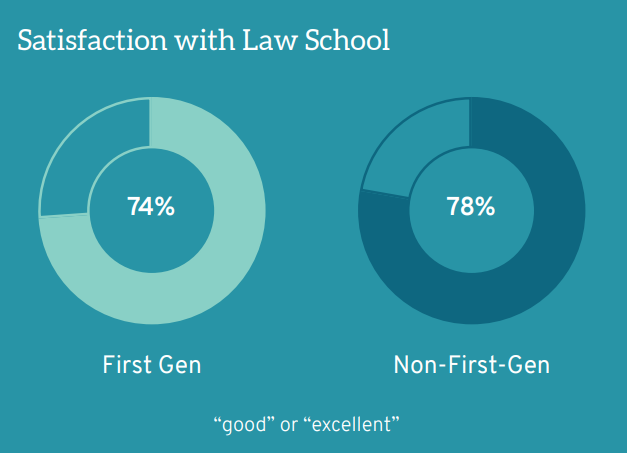In our last post, we shared some of the demographic characteristics of first-gen law students, which we define as law students who do not have at least one parent with a bachelor’s degree. In this post, we will dig deeper into the first-gen law student experience and how it differs from the experiences of non-first-gen law students.
Time Usage
LSSSE asks students to estimate the average number of hours they spend each week engaging in activities that are directly and indirectly related to the educational experience. Time usage is important because it reflects students’ academic engagement and overall priorities. First-gen students are more likely to attend law school part-time, which suggests that they have complicated schedules with competing demands, rather than a sole focus on law school. LSSSE data show that high percentages of first-gen students have familial obligations as caretakers for dependents living in their household. Forty-four percent (44%) of first-gen students spend time caring for dependents, compared to 33% of non-first-gen students.

First-gen students are just as engaged as their non-first-gen peers in academic pursuits outside of class, despite the fact that they have more responsibilities competing for their time. First-gen students work with students and faculty on group projects at equal or greater levels relative to non-first-gen students. Roughly equal percentages of first-gen students (19%) and non-first-gen students (18%) report that they frequently work with faculty members on activities other than coursework (including committees, orientation, student life activities, etc.). Likewise, 33% of first-gen (and 31% of non-first-gen) students frequently work with classmates outside of class to prepare assignments. The diligence of first-gen students is particularly impressive given their personal obligations. One third (33%) of first-gen students always come to class fully prepared despite their family duties and work schedules, the same percentage as non-first-gen students (who tend to work less and have fewer familial obligations).
Satisfaction
First-gen students, like law students overall, are overwhelmingly satisfied with their law school experience. Seventy-four percent (74%) of first-gen students evaluate the educational experience at their law school as “good” or “excellent,” similar to non-first-gen students (78%). Furthermore, 77% of first-gen (and 79% of non-first-gen) students report they would choose to attend the same law school again, with the benefit of hindsight. These trends are particularly noteworthy given the increased financial risks and other sacrifices made by first-gen students to attend law school.

First-gen students face unique challenges and responsibilities as they navigate legal education. Law schools should take the findings from this Annual Report, as well as their own school-specific LSSSE data, to craft targeted programs to support first-gen students. Better supporting them personally will free up time and resources for first-gen students to devote to not only academics, but other co-curricular pursuits so they are optimally placed to thrive as they enter the legal profession.
